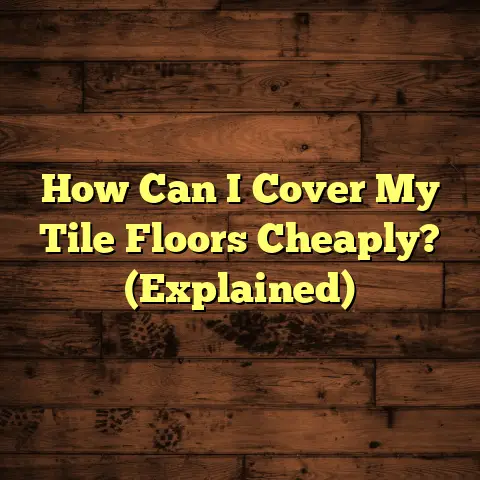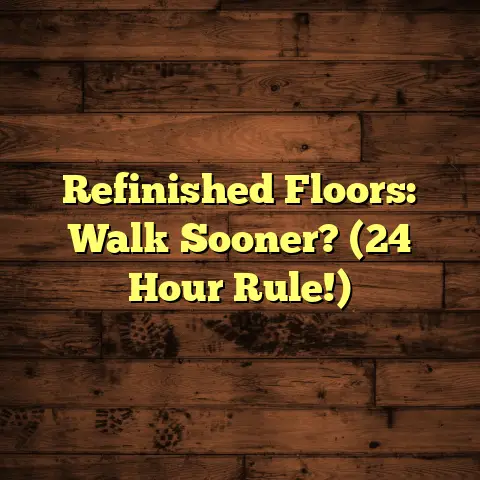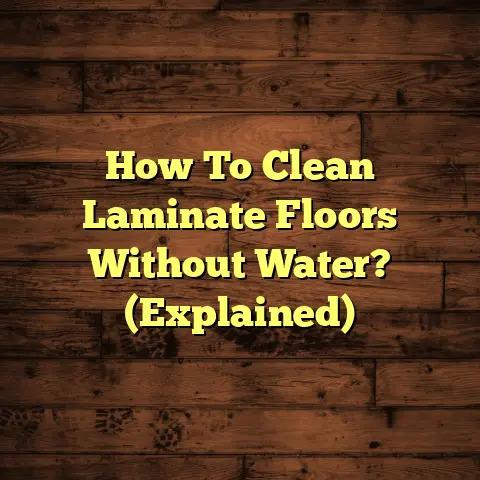Garage Floors: What Are They? (5 Material Must-Knows!)
Remember Walter White’s garage lab in “Breaking Bad”? Or maybe you’re more familiar with the tricked-out garages on “Pimp My Ride.”
Garages aren’t just for parking cars anymore. They’re workshops, gyms, storage spaces, and sometimes, even laboratories!
The one thing they all have in common? The floor. And trust me, as a flooring contractor for over 20 years, I can tell you: it’s more important than you think.
Let’s dive into the world of garage floors. We’ll explore what they are, why they matter, and the top 5 materials you need to know about.
Section 1: Understanding Garage Floors
Definition and Purpose
What is a garage floor? Well, at its most basic, it’s the foundation you walk, drive, and work on in your garage.
But it’s so much more than that.
-
Protection: It shields the underlying structure of your home from moisture, oil, and other damaging substances.
-
Safety: A good garage floor provides a safe, slip-resistant surface to work on.
-
Aesthetics: Let’s be honest, a cracked, stained concrete floor isn’t exactly a welcoming sight. A well-chosen floor can dramatically improve the look of your garage.
Evolution of Garage Floors
Garages haven’t always been the extensions of our homes that they are today.
Think back:
-
Early Days: Dirt or gravel were common. Imagine trying to work on your car on that!
-
Concrete’s Rise: As cars became more popular, concrete became the standard. It was durable and relatively inexpensive.
-
Modern Era: Today, we have a huge range of options, from epoxy coatings to stylish vinyl tiles.
The rise of car ownership and the DIY culture have definitely fueled this evolution. People want a garage that’s functional and looks good.
Section 2: The Five Must-Know Garage
Floor Materials
Okay, let’s get into the nitty-gritty. These are the materials I recommend most often, and for good reason.
1. Concrete: The Classic Choice
Concrete is king for a reason. It’s the most common garage flooring material, and for many homeowners, it’s the only option they consider.
-
Durability: Concrete is tough. It can handle the weight of vehicles and heavy equipment.
-
Cost-Effectiveness: Compared to other options, concrete is relatively inexpensive.
-
Maintenance: It’s easy to clean. A simple sweep or mop usually does the trick.
But plain concrete can be a bit boring. That’s where finishes come in:
-
Polished Concrete: Grinding and polishing concrete creates a smooth, shiny surface. It’s a modern look that’s easy to maintain.
-
Stained Concrete: Staining adds color and depth to concrete. You can achieve a wide range of looks, from rustic to contemporary.
-
Epoxy-Coated Concrete: We’ll talk more about epoxy in a bit, but coating concrete with epoxy is a great way to protect it and add a pop of color.
My Take: Concrete is a solid, reliable choice. It’s a great starting point, and you can always upgrade it with a finish later.
2. Epoxy Flooring: The Protective
Powerhouse
Epoxy flooring is a two-part system that creates a hard, durable coating on top of your concrete floor.
Think of it as a super shield for your garage.
-
Resistance: Epoxy is resistant to stains, chemicals, and spills. This is huge if you work on cars or do any kind of messy projects in your garage.
-
Durability: It’s incredibly tough and can withstand heavy traffic and impacts.
-
Customization: Epoxy comes in a wide range of colors and finishes. You can even add decorative flakes or metallic pigments for a unique look.
Installation:
The installation process is crucial. It typically involves:
-
Surface Preparation: The concrete needs to be clean, dry, and free of any cracks or imperfections.
-
Mixing: The two parts of the epoxy are mixed together according to the manufacturer’s instructions.
-
Application: The epoxy is applied to the concrete using a roller or squeegee.
-
Curing: The epoxy needs time to cure properly. This can take several days, depending on the product.
Potential Downsides:
-
Cost: Epoxy is more expensive than plain concrete.
-
DIY Difficulty: While you can DIY epoxy flooring, it’s not the easiest project. Proper preparation and application are key.
My Take: Epoxy is a fantastic choice if you want a durable, easy-to-clean, and attractive garage floor. It’s especially good for workshops or garages that see a lot of spills.
3. Rubber Flooring: Comfort Meets
Functionality
Rubber flooring is often overlooked, but it’s a great option, especially if you spend a lot of time working in your garage.
-
Comfort: Rubber is soft and cushioned, making it easier on your feet and joints.
-
Sound Dampening: It absorbs sound, which can be a big plus if you’re doing noisy projects.
-
Slip Resistance: Rubber provides excellent traction, even when wet.
-
Cleaning: It’s easy to clean with soap and water.
Styles and Thicknesses:
Rubber flooring comes in different styles:
-
Rolls: Large rolls of rubber that cover the entire floor.
-
Tiles: Interlocking rubber tiles that are easy to install.
Thickness matters too. Thicker rubber flooring is more durable and provides more cushioning.
Uses:
-
Gyms: Rubber flooring is perfect for home gyms.
-
Workshops: It provides a comfortable and safe surface to work on.
-
Play Areas: It’s a great option for kids’ play areas in the garage.
My Take: Rubber flooring is a practical and comfortable choice. It’s a great option if you value comfort and safety over pure aesthetics.
4. Vinyl Flooring: A Stylish Alternative
Vinyl flooring has come a long way. It’s no longer the cheap, flimsy stuff you might remember from your grandma’s kitchen.
Today’s vinyl flooring is durable, stylish, and a great way to enhance the look of your garage.
-
Aesthetics: Vinyl comes in a huge range of colors, patterns, and styles. You can even find vinyl that looks like wood or stone.
-
Durability: Modern vinyl is tough and can withstand a lot of wear and tear.
-
Moisture Resistance: Vinyl is waterproof, making it a good choice for garages that might see some moisture.
Types of Vinyl:
-
Sheets: Large sheets of vinyl that cover the entire floor.
-
Tiles: Individual vinyl tiles that are glued down.
-
Planks: Vinyl planks that look like wood flooring.
Pros and Cons:
-
Sheets:
- Pros: Seamless, waterproof
- Cons: Difficult to install
-
Tiles:
- Pros: Easy to install, affordable
- Cons: Can be less durable than sheets
-
Planks:
- Pros: Stylish, easy to install
- Cons: Can be more expensive than tiles
My Take: Vinyl flooring is a great option if you want a stylish and durable garage floor. It’s especially good if you want to mimic the look of wood or stone without the high cost and maintenance.
5. Tile Flooring: The Elegant Option
Tile flooring in a garage? It might sound unconventional, but it can be a stunning choice.
We’re talking ceramic or porcelain tiles, which are incredibly durable and come in a wide range of designs.
-
Aesthetics: Tile offers a level of elegance that other materials can’t match. You can create intricate patterns and designs.
-
Durability: Ceramic and porcelain tiles are incredibly tough and can last for decades.
-
Maintenance: Tile is easy to clean and maintain.
Designs and Patterns:
The possibilities are endless. You can choose from:
-
Solid Colors: Classic and timeless.
-
Patterns: Geometric patterns, floral designs, and more.
-
Textures: Tiles with textured surfaces for added grip.
Benefits:
-
Longevity: Tile can last for decades with proper care.
-
Easy Maintenance: A simple sweep and mop are usually all you need.
-
Value: Adds value to your home.
Drawbacks:
-
Cost: Tile is one of the more expensive garage flooring options.
-
Installation: Installing tile can be tricky and may require professional help.
-
Cold: Tile can be cold underfoot, especially in colder climates.
My Take: Tile flooring is a luxurious choice for garages. It’s perfect if you want to create a high-end look and are willing to invest in quality materials and installation.
Section 3: Conclusion
Choosing the right garage floor is a big decision. It’s not just about aesthetics; it’s about function, durability, and safety.
We’ve covered five must-know materials:
-
Concrete: The classic, reliable choice.
-
Epoxy: The protective powerhouse.
-
Rubber: Comfort meets functionality.
-
Vinyl: A stylish alternative.
-
Tile: The elegant option.
The best material for your garage depends on your individual needs and preferences.
- Consider your budget.
- Think about how you use your garage.
- Prioritize your needs.
- Do your research!
Your garage floor is more than just a surface to park your car on. It’s an integral part of your home.
With the right choice, you can transform your garage into a space that’s functional, beautiful, and truly your own.





